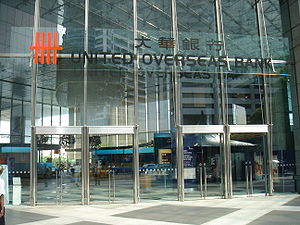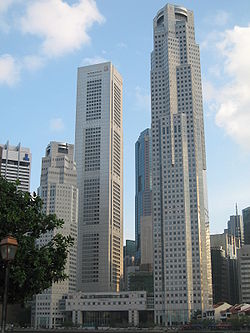- United Overseas Bank
-
United Overseas Bank Limited 
Type Public (SGX: U11) Founded 1935 Headquarters Singapore Key people Wee Cho Yaw, Chairman
Wee Ee Cheong, Deputy Chairman & President & CEOProducts Financial Services Net income S$2.569 billion  (FY 2006)
(FY 2006)Website www.uobgroup.com The two towers of the UOB Plaza, located on the southern bank of the Singapore River. OUB Building is in the background.
United Overseas Bank Limited SGX: U11 (Simplified Chinese: 大华银行有限公司; Pinyin: Dàhuá Yínháng Yǒuxìan Gōngsī), abbreviated as UOB (Simplified Chinese: 大华银行; Pinyin: Dàhuá Yínháng) is a bank incorporated in Singapore. It was founded 6 August 1935 by Kuching-born Datuk Wee Kheng Chiang, father of the present United Overseas Bank Group Chairman, Mr. Wee Cho Yaw, and a group of seven Chinese businessmen. UOB is currently the third largest bank based in Singapore.
Contents
Bank Subsidiaries
- Far Eastern Bank (Singapore)
- UOB Malaysia (Malaysia)
- UOB Thailand (Thailand)
- PT Bank UOB Indonesia (Indonesia)
- PT Bank Buana (Indonesia)
Far Eastern Bank (Singapore)
In 2001, the bank successfully acquired Overseas Union Bank Ltd with a US$5.7 billion offer which outbid rival DBS Bank's $5.2 billion bid. It legally became a single entity under the UOB name from 2 January 2002, becoming Singapore's largest bank in terms of domestic customer loans, credit cards and market capitalisation.
UOB Malaysia
United Overseas Bank (Malaysia) Bhd (UOB Malaysia) is a subsidiary of the United Overseas Bank Group, Singapore. Incorporated in Malaysia in 1993, UOB Malaysia took over the operations of Lee Wah Bank Limited (LWB) in 1994. LWB was incorporated in Singapore in 1920 and opened its first Malaysian branch in 1956. In 1973, LWB became a wholly owned subsidiary of United Overseas Bank Limited, Singapore.
On 7 June 1997, UOB Malaysia merged with Chung Khiaw Bank (Malaysia) Bhd (CKBM) and enlarged its paid up capital from RM210 million to RM470 million. United Overseas Bank (Malaysia) Bhd and Overseas Union Bank (Malaysia) Bhd merged into one legal entity on 2 February 2002 following the merger of UOB and OUB in Singapore.
UOB Thailand
UOB Thailand has merged UOB's two banking subsidiaries, Bank of Asia Public Company Limited ("BOA") and UOB Radanasin Bank Public Company Limited ("UOB Radanasin"). UOB is undertaking a delisting tender offer for the remaining 0.01% shares in UOB Radanasin not held by it, to then delist UOB Radanasin and then sell its entire stake UOB Radanasin to BOA. Following the merger UOB Radanasin will be liquidated and its name changed to "United Overseas Bank (Thai) Public Company Limited".
UOB's Thailand headquarters is Sathorn Road's Robot Building.
PT Bank UOB Indonesia & PT Bank UOB Bank Buana
Singapore's United Overseas Bank is raising its stake in Indonesia's PT Bank Buana Indonesia. In a statement, UOB said its wholly owned subsidiary - United Overseas Bank International Investment (UOBII) - had entered into an agreement with P.T. Sari Dasa Karsa for the acquisition of 1,729,872,821 shares in P.T. Bank Buana Indonesia Tbk. The completion of the acquisition is conditional upon certain matters, including the execution of a definitive sale and purchase agreement, and obtaining regulatory consents. On 15 July 2005 , UOB requested trading in its shares to be halted pending an announcement. The company has requested the lifting of trading halt on 18 July 2005. UOB currently owns 23 percent of the issued common shares in Bank Buana. After completion of the acquisition, its shareholding will increase to 53 percent and Bank Buana will become a subsidiary of UOBII. Upon completion of the acquisition, UOB will conduct a tender offer for the rest of the shares in Bank Buana.
The total consideration for the sales is approximately S$285 million. UOB intends to fund the acquisition using internal resources. The Singapore lender bought a 23 percent stake in Bank Buana for S$196 million in 2004 [1]
UOB Philippines
United Overseas Bank (Philippines) (UOB Philippines) is also a subsidiary of the United Overseas Bank Group, Singapore. This subsidiary was formed in 1999, and has the largest branch network in the Philippines among all the foreign based banks in the country. In late April 2005, there was talk about selling UOB Philippines or merging it with other banks as losses mounted.
United Overseas Bank has said it is selling 66 of its 67 Philippine branches to Banco de Oro Universal Bank, in a move aimed at rationalising its operations in the country. The deal is worth 600 million pesos, or S$11.1 million, and is subject to due diligence and regulatory approval. UOB Philippines was in the red to the tune of some S$21 million in 2004, due to a poor business environment. In 2003 it booked a loss of S$19.7 million. UOB said it was converting UOB Philippines into a thrift bank, focusing on wholesale banking and fee-based income. As such, it would not need a full branch network; hence, the sale to Banco De Oro.
The Philippine losses are relatively small compared with the S$1.45 billion in net profit that UOB earned in 2004. Looking at the bigger picture, analysts say the deal will allow UOB to focus instead on other more profitable overseas markets. Analysts expect UOB to post a 2005 full-year net profit of S$1.7 billion, up some 17 percent from last year, as contributions from these purchases kick in.
China
United Overseas Banking Group, has been in talks to buy into China’s Industrial Bank, formerly known as Fujian Industrial Bank.[when?]
[1] UOB (China), a wholly owned subsidiary of United Overseas Bank Limited (“UOB”), was incorporated in the People’s Republic of China on 18 December 2007 with a registered capital of RMB3 billion. UOB (China) officially commenced business on 2 January 2008. UOB’s association with China goes back more than 20 years, when it set up its first representative office in Beijing in 1984. To date, UOB (China)’s network comprises 10 branches and sub-branches in Beijing, Shanghai, Guangzhou, Shenzhen, Xiamen, Chengdu, Shenyang and Tianjin. UOB (China) offers a comprehensive range of foreign currency and RMB banking services to all customer segments. It has also obtained the retail RMB licence to offer RMB banking services to local individuals. Banking services include deposits, loans, project and trade financing, guarantees and bills discounting, and foreign currency exchange. For more information, visit uobchina.com.cn. However, unlike some of its competitors, it has not gained the right to issue debit cards in China and thus remains at a disadvantage.
Management team
- Wee Cho Yaw, Chairman
- Wee Ee Cheong, Chief Executive Officer (with immediate effect as of 27 April 2007)
- Chong Kie Cheong, SEVP, Institutional Financial Services & Private Banking
- Francis Lee Chin Yong, SEVP, Peronal Financial Services & International
- Terence Ong Sea Eng, SEVP, Global Treasury & Asset Management
- Susan Hwee, EVP, Information Technology & Operations
- Eddie Khoo Boo Jin, EVP, Personal Financial Services
- Lee Wai Fai, CFO & EVP, Corporate Services
- Tham Ming Soong, EVP, Risk Management
- Wee Joo Yeow, EVP, Head, Corporate Banking
- Jenny Wong Mei Leng, EVP, Human Resources
- Yeo Eng Cheong, EVP, Commercial Credit
- Tay Tong Poh, EVP, Investment Banking
- Chew Mei Lee, SVP, Group Compliance
- Vivien Chan, SVP, Group Legal & Secretariat
See others
- UOB-Kay Hian
References
External links
UOB Group
UOB Subsidiaries
Categories:- Companies listed on the Singapore Exchange
- Banks of Malaysia
- Banks of Singapore
- Companies established in 1935
Wikimedia Foundation. 2010.


